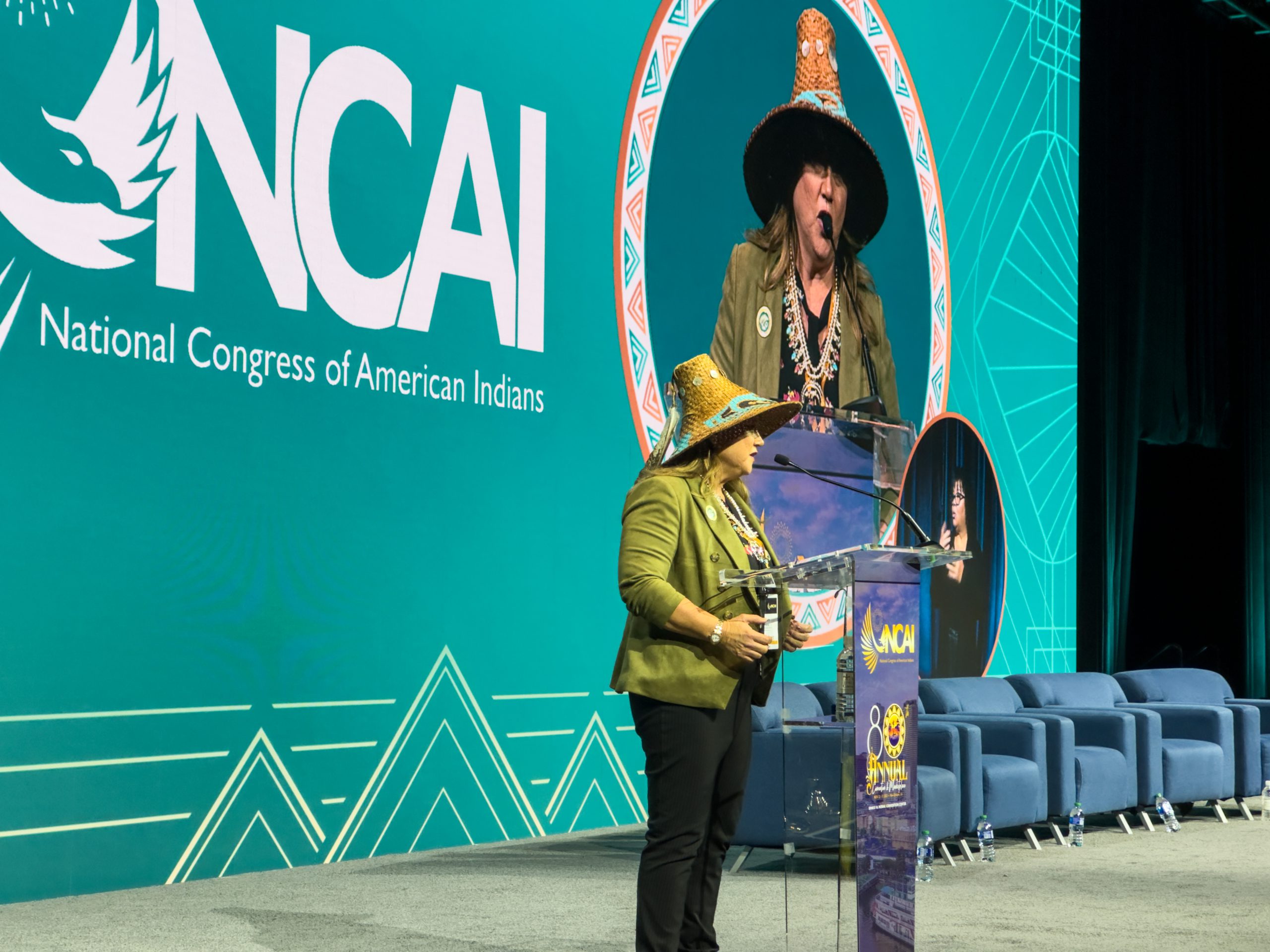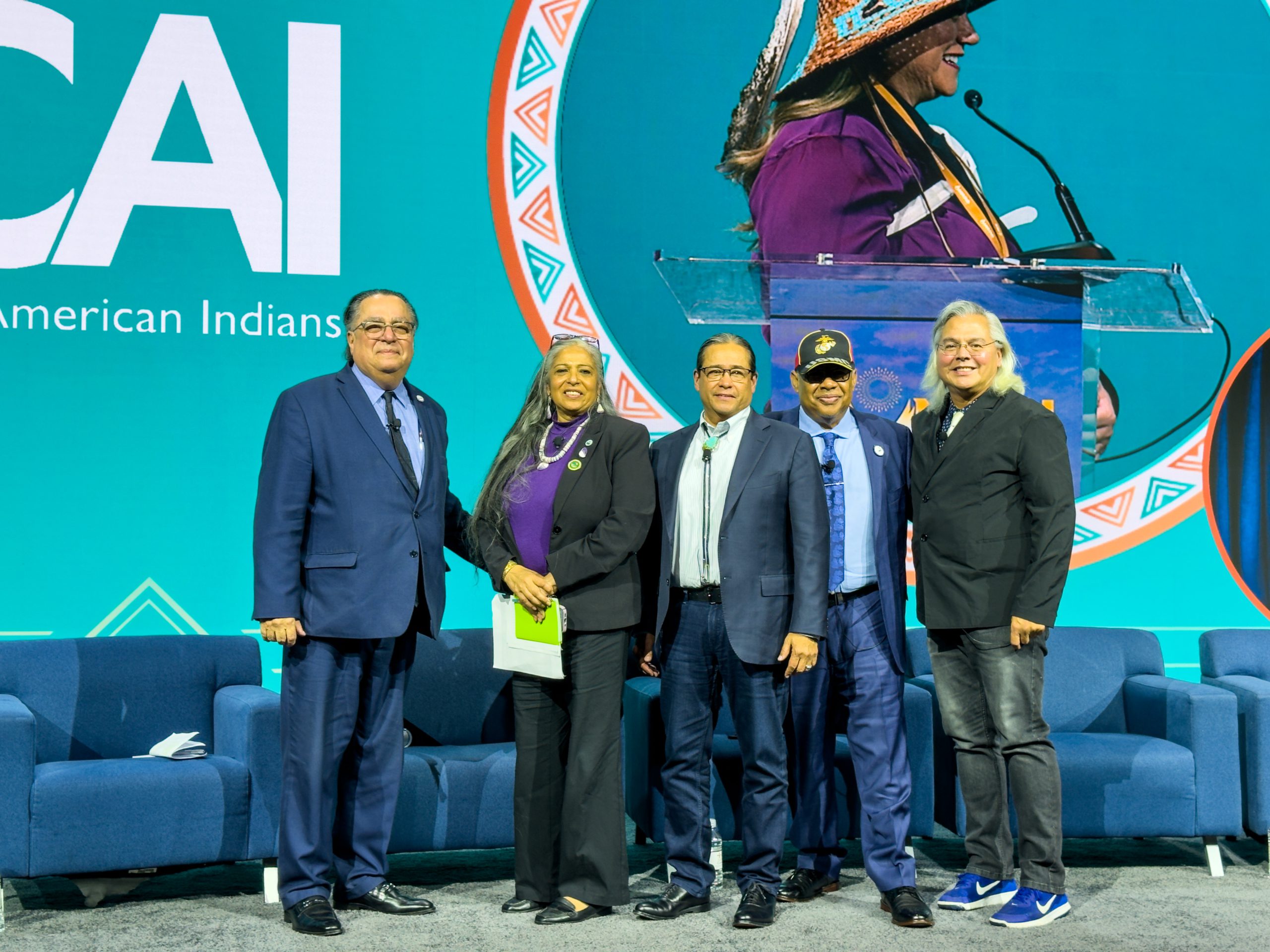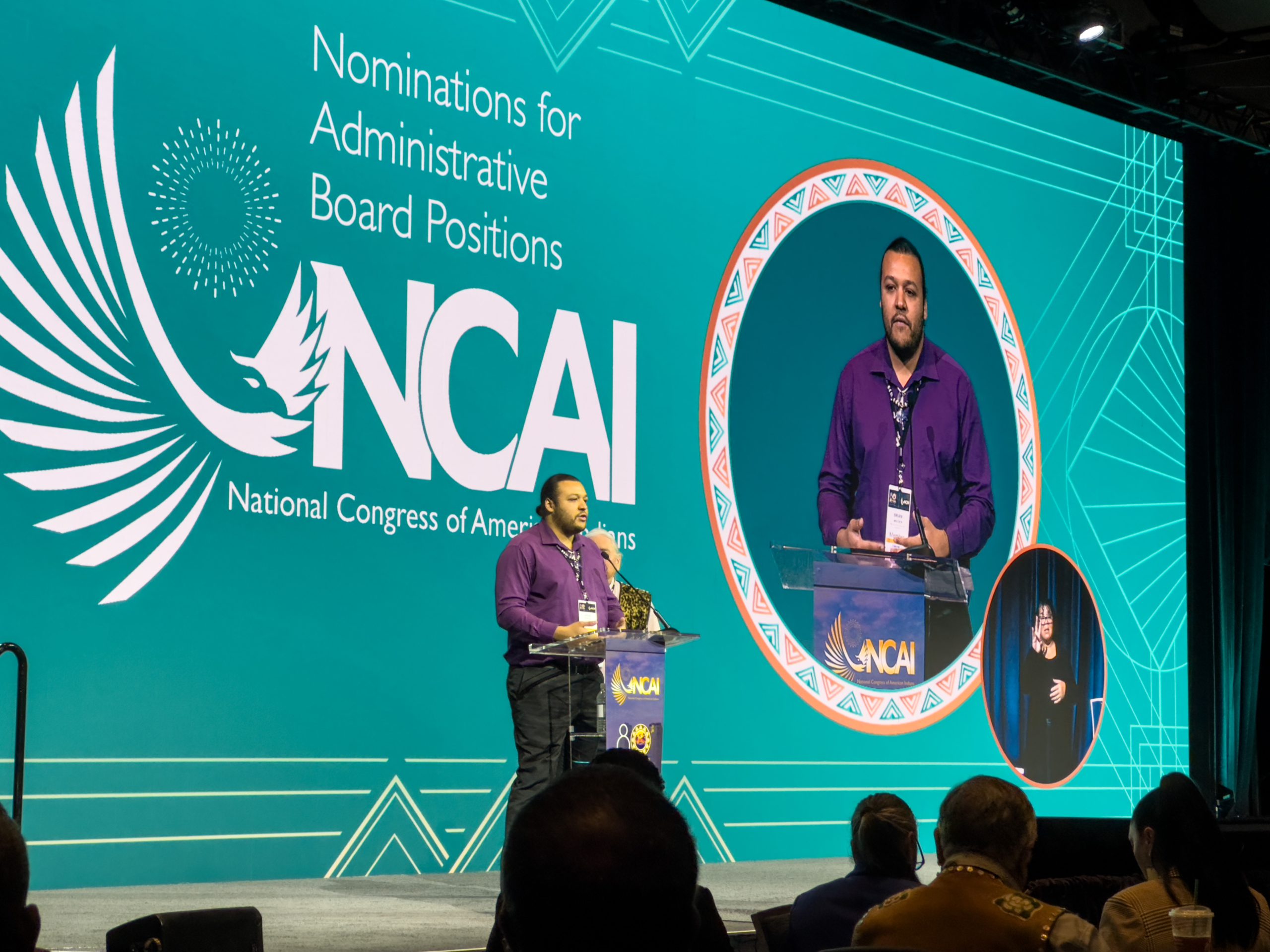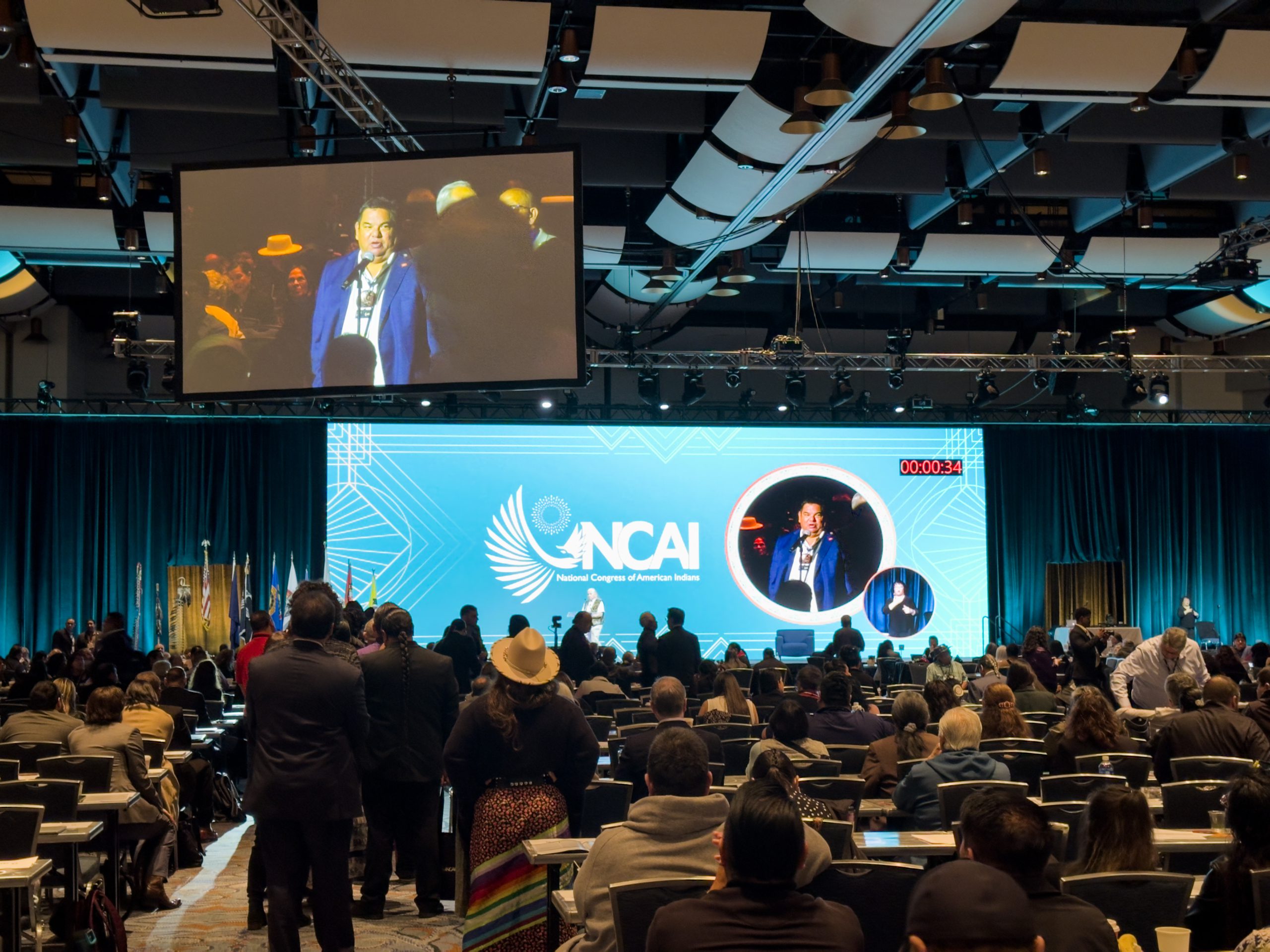Indianz.Com >
News > National Congress of American Indian draws huge crowd for annual convention
 President Fawn Sharp of the National Congress of American Indians addresses the organization’s 80th annual convention in New Orleans, Louisiana, on November 15, 2023. Photo by Indianz.Com (CC BY-NC-SA 4.0)
President Fawn Sharp of the National Congress of American Indians addresses the organization’s 80th annual convention in New Orleans, Louisiana, on November 15, 2023. Photo by Indianz.Com (CC BY-NC-SA 4.0)
National Congress of American Indian draws huge crowd for annual convention
Thursday, November 16, 2023
By Acee Agoyo
Indianz.Com
NEW ORLEANS, Louisiana —
The nation’s largest inter-tribal advocacy organization is at a major crossroads as it celebrates a milestone anniversary here.
More than 2,000 people are attending the
National Congress of American Indians (NCAI) 80th annual convention in Louisiana’s biggest city. The crowd is one of the largest in the organization’s storied history as a promoter and defender of tribal sovereignty and self-determination.
Just as significantly, NCAI’s ranks have grown to 250 member tribes at the start of the convention on Monday. In a sign of the importance of the event, a quorum of 150 tribal nations was reached early, on only the second day of the
historic gathering at the Ernest N. Morial Convention Center in New Orleans.
“I know we’re going to be here for 80 more years,” NCAI President Fawn Sharp said on Monday as she delivered the final report of two-term stint as the organization’s highest executive.

Indianz.Com
Interest in the 80th annual convention is driven by controversial
amendments to the NCAI constitution. Tribal delegates and attendees spent more than three hours on Tuesday morning, debating whether to limit membership — and voting rights — in the organization to federally recognized Indian nations and their citizens.
“Fake tribes,”
Chief Ben Barnes of the
Shawnee Tribe said in summing up what he described as a major problem facing NCAI, “should be of concern to all established tribes with treaty and trust relations with the United States.”
“Groups claiming to be us … are full voting members here within NCAI,” said Barnes, citing the presence of a “Shawnee” group that lacks a formal relationship with the federal government.
But other leaders pushed back on the notion that federal recognition determines an Indian nation’s legitimacy. Ron Allen, the longtime chair of the
Jamestown S’Klallam Tribe and a past president and treasurer of NCAI, was among those speaking out against the proposed amendments to the organization’s governing document.
“We shouldn’t rely on the federal government to identify who we are,” Allen said, noting that when he joined NCAI back in 1978, his tribe in Washington state had yet to
gain federal recognition.
 From left: Levi Rickert, Cheryl Andrews-Maltais, Mark Macarro, Marshall Pierite and Aaron Payment take part in a presidential candidate forum at the National Congress of American Indians 80th annual convention in New Orleans, on November 14, 2023. Photo by Indianz.Com (CC BY-NC-SA 4.0)
From left: Levi Rickert, Cheryl Andrews-Maltais, Mark Macarro, Marshall Pierite and Aaron Payment take part in a presidential candidate forum at the National Congress of American Indians 80th annual convention in New Orleans, on November 14, 2023. Photo by Indianz.Com (CC BY-NC-SA 4.0)
In addition to Allen, another prominent leader opposed the amendments.
Marshall Pierite, the chair and chief executive officer of the
Tunica-Biloxi Tribe, happens to be running for president of NCAI at the convention taking place in his home state of Louisiana.
“We will not allow a piece of paper from the federal government to tell us who we are,” said Pierite, whose tribe didn’t gain federal recognition until 1981.
But another candidate for NCAI president is backing the constitutional amendments. During a candidate forum held after the lengthy debate, Mark Macarro, the longtime chair of the
Pechanga Band of Indians, said the spirited discussion is a sign of a healthy organization.
“What you are looking at is honest to goodness, debate here — a difference of opinion, certainly, sharply,” Macarro said on Wednesday, noting that his California-based tribe also supports the amendments. “But as a congress, this is what we do.”
The third candidate for president — Cheryl Andrews-Maltais, the chairwoman of the
Aquinnah Wampanoag Tribe — said she saw some value in the amendments. But she wouldn’t commit to a firm position even when pressed by Levi Rickert, the publisher and editor of
Native News Online who served as a co-moderator of the forum.
“I would not presume to say who’s a tribe in California or Louisiana — and I don’t expect anybody from outside of our nation to presume to tell us who’s a tribe or a community,” said
Andrews-Maltais, whose Massachusetts-based gained
federal recognition in 1987.
 David Weeden, chair of the Mashpee Wampanoag Tribe, delivers a speech in support of his candidacy as Vice President of the National Congress of American Indians during the organization’s 80th annual convention in New Orleans, Louisiana, on November 14, 2023. Photo by Indianz.Com (CC BY-NC-SA 4.0)
David Weeden, chair of the Mashpee Wampanoag Tribe, delivers a speech in support of his candidacy as Vice President of the National Congress of American Indians during the organization’s 80th annual convention in New Orleans, Louisiana, on November 14, 2023. Photo by Indianz.Com (CC BY-NC-SA 4.0)
But another leader from Massachusetts opposed the amendments. David Weeden, the chair of the
Mashpee Wampanoag Tribe, happens to be running for vice president of NCAI.
“We the Mashpee stand for unity,” said Weeden, whose tribe didn’t gain
federal recognition until 2007, one of the more recent cases.
The Shawnee Tribe, along with the
Eastern Band of Cherokee Indians, have teamed up to offer two amendments to the NCAI constitution that tie “Tribal Membership” to those tribes with an acknowledged nation-to-nation relationship with the federal government. Groups with state recognition will be participate under “Associate Membership” — a designation that does not come with voting rights.
“Tribes from miles away are coming to our ancestral homelands, to tell us … that we are not a tribe,” said Lora Ann Chaisson, Principal Chief of the
United Houma Nation. On the opening day of NCAI’s convention, she delivered the land acknowledgement as one of the Louisiana-based host tribes.
A third amendment, proposed by the
Ute Tribe, limits “Indian Individual Membership” in NCAI to citizens of federally recognized tribes. The proposal further requires candidates for all officers in the organization to be the same.
“We are a treaty tribe,” said Mike Natchees, a Ute council member. “Follow the rules — that’s where we’re coming from.”
Besides the constitutional amendments, interest in NCAI is high at the 80th annual convention due to the election of new administrative board officers. Along with president, attendees are choosing a new vice president, secretary and treasurer.
A record number of candidates have lined up for most of the positions, in contrast to years prior when NCAI struggled to attract tribal leaders to run for the board.
This year, there are three candidates for president, three for vice president and four for secretary.
The candidates were nominated for their positions by fellow leaders on Wednesday morning. Each was given an opportunity to address the general assembly ahead of voting on Thursday.
The only NCAI leadership position where just one candidate was in the running was treasurer. Following a motion from the floor of the general assembly, David Woerz, a legislator from the
Chickasaw Nation, was named to the post by unanimous acclamation.
“We must be good stewards of what the Creator gave us,” Woerz said in describing his vision for NCAI.
 Attendees line up by the dozens for a chance to speak on amendments to the National Congress of American Indians constitution during the organization’s 80th annual convention in New Orleans, Louisiana, on November 14, 2023. Photo by Indianz.Com (CC BY-NC-SA 4.0)
Attendees line up by the dozens for a chance to speak on amendments to the National Congress of American Indians constitution during the organization’s 80th annual convention in New Orleans, Louisiana, on November 14, 2023. Photo by Indianz.Com (CC BY-NC-SA 4.0)
Voting will take place over two hours on Thursday morning. The constitutional amendments face a high bar for passage — according to the NCAI constitution, two-thirds of “the total registered tribal and individual members” must approve in order for them to be adopted.
Based on the comments from tribal delegates and the public, support for the amendments is coming from tribes in Oklahoma, the Great Plains and the Southwest.
The
Affiliated Tribes of Northwest Indians, representing over 50 tribes in the Northwest, has passed a resolution in support.
Opposition was voiced from delegates and attendees from the Southeast and the Northeast, the two regions that have long been dominated by state recognized tribes. But at least three representatives from Alaska voiced opposition as well.
Regardless of the outcome on the amendments, several leaders — including the three candidates for president — said NCAI must take further steps to address the issues raised during the debate, particularly those surrounding the legitimacy of certain groups that have assumed specific tribal identities.
 Chief Ben Barnes of the Shawnee Tribe speaks in support of amendments to the National Congress of American Indians constitution during the organization’s 80th annual convention in New Orleans, Louisiana, on November 14, 2023. Photo by Indianz.Com (CC BY-NC-SA 4.0)
Chief Ben Barnes of the Shawnee Tribe speaks in support of amendments to the National Congress of American Indians constitution during the organization’s 80th annual convention in New Orleans, Louisiana, on November 14, 2023. Photo by Indianz.Com (CC BY-NC-SA 4.0)
NCAI expects to announce the results of the election by mid-morning on Thursday.
However, due to the number of candidates running for the executive board positions, it’s possible that run-offs may be needed for some positions if no candidate secures more than 50 percent of the vote. An additional hour has been set aside for run-off voting if necessary.
The following is the list of NCAI candidates and their tribal affiliations:
President
Cheryl Andrews-Maltais, Wampanoag Tribe of Gay Head (Aquinnah)
Mark Macarro, Pechanga Band of Indians
Marshall Pierite, Tunica-Biloxi Tribe of Louisiana
1st Vice President
David W. Hill, Muscogee (Creek) Nation
Moses Owen, Akiak Native Community
Brian Weeden, Mashpee Wampanoag Tribe
Recording Secretary
Sandra Golden, Muscogee (Creek) Nation
Jerome Kasey, III, White Mountain Apache Tribe
Nickolaus D. Lewis, Lummi Nation
Juana Majel-Dixon, Pauma Band of Mission Indians
Treasurer
David Woerz, Chickasaw Nation
The winners of the NCAI leadership positions will be sworn in on Friday, the final day of the 80th annual convention.
Related Stories





